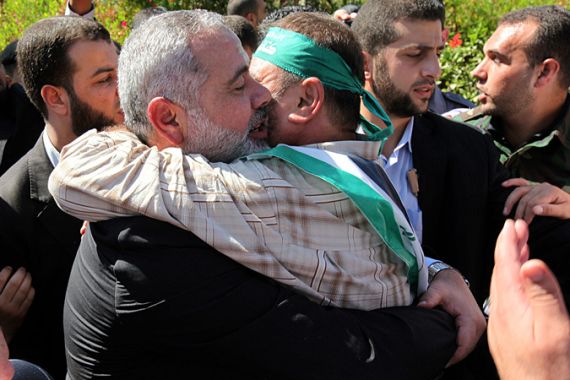Unrest in Egypt spells trouble for Gazans
Egypt’s closure of the Rafah border crossing has stranded hundreds of travelers.

Rafah, Gaza Strip – Visiting the Gaza Strip to join his Palestinian family during the Eid holiday has proven to be an unwise decision for Wael Salem, a 24-year-old engineering student. He didn’t know he was putting his academic studies in Sweden at risk.
Salem is stuck in Gaza because Egypt has closed the Rafah crossing point, the Palestinian enclave’s main gateway not only to Egypt, but to the rest of the outside world. He is one of hundreds of Palestinians who are not able to return to their work and studies outside Gaza as a result.
Since the Egyptian military overthrew President Mohamed Morsi on July 3, Egypt has reduced the working hours at Rafah to about five a day. Work has also been suspended at the terminal when gunfire is aimed at Egyptian security posts and checkpoints in the restive Sinai Peninsula.
Gaza’s Hamas authorities said that the crossing is, for all practical purposes, closed. Before July, an average of 1,200 travellers used to leave Gaza via Rafah each day. This figure has dwindled to around 150 after Morsi’s ouster.
There is a real crisis due to the sudden closure of the border; we have thousands of people stuck inside and outside Gaza.
On Saturday, Egypt unexpectedly opened the crossing to allow a number of homebound people into Gaza after they had been stuck in the Sinai for days. But the following day, only one bus left Gaza using the Rafah crossing.
And on Monday, after 25 Egyptian soldiers were killed by a booby trap in the Sinai Peninsula, Egyptian authorities announced that the Rafah border will be closed until further notice.
“The last two openings of the crossing happened without any coordination with us. It’s an exceptional occurence, and doesn’t reflect any improvement in the border operation,” said Maher Abu Sabha, director of border crossings in Hamas’ government in Gaza.
Ihab al-Ghusen, a spokesperson for Hamas, said his government doesn’t have information as to when the border will be opened again, and that they were still negotiating with Egypt to reopen it.
“There is a real crisis due to the sudden closure of the border. We have thousands of people stuck inside and outside Gaza,” said Ghusen.
Because Gaza has no airport, the Rafah crossing serves as a lifeline for the more than 1.5 million Palestinians who live in the besieged strip. Israel sometimes allows local employees of international organisations and holders of international passports to pass through its territory through the Erez crossing point in northern Gaza, in order to get to airports in Jordan.
Israeli newspaper Yedioth Ahronoth reported Thursday that Israel’s Coordinator of Government Activities in the Territories (COGAT) instructed the Coordination and Liaison Administration of the Erez Crossing to prepare for increased activity following the decision by the Egyptian authorities to close Rafah. Quoting sources from COGAT, the paper added that Erez was instructed to expect many applications from foreigners and Palestinians who could not exit through Rafah.
Gaza’s ruling Hamas movement, an offshoot of the Muslim Brotherhood, thought it had an important ally in Egypt when Morsi came to power in 2012. The former Egyptian president permanently opened the Rafah border, which was closed during Hosni Mubarak’s time in office, and the tunnels connecting Gaza to Egypt also worked regularly.
But in addition to closing Rafah, Egypt has also begun to systematically demolish the tunnels under the Gaza-Sinai border. These two measures, in addition to an alleged Egyptian media campaign against Hamas, have demoralised the Islamist movement in Gaza after a brief period of high expectations.
Families gathered at the Palestinian side of the Rafah border, desperate to cross to Egypt before they were informed that the Egyptian authorities had closed the border until further notice.
Egyptian Ibraheem Sayyed, 50, and his Palestinian wife managed to enter Gaza one day before the border closure. Sayyed said he had come to Gaza on urgent business and was supposed to spend only one day there. “I left my children behind in Port Said. I’m so worried about them because of what’s happening there. They are worried about their parents as well,” he said, while unloading his luggage to go home.
Salem said he had been aware that the Rafah border was not always stable, but he was very desperate to see his family after four lonely years in Sweden.
“I’m very disappointed – I lost my flight already,” he said. “I hope I won’t also lose the whole semester.”